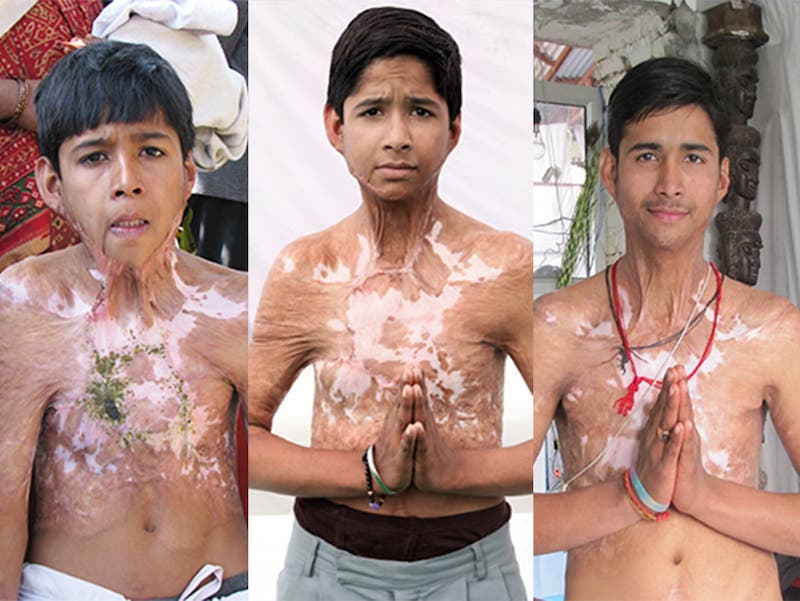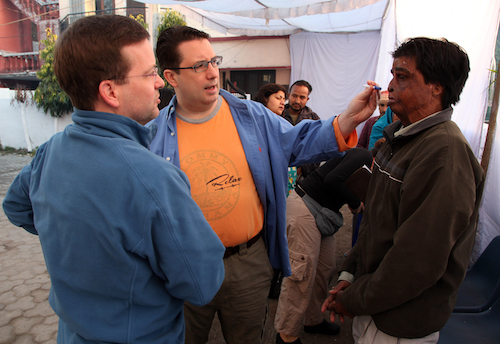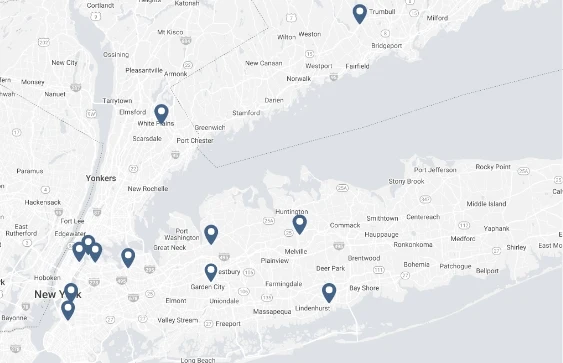A personal account from Thomas Davenport, MD



Punkaj was just like any other 10-year-old boy in India. He liked to play with his friends, and he went to school. He particularly enjoyed a good cup of tea. One day as he went to prepare his cup of tea, the crude stove he was using to heat the water suddenly exploded right in front of him, severely burning his chest, neck and arms. Without access to proper care for severe burns like these, Punkaj’s injury was left to “heal” by itself.
Consequentially, his skin “shrank” to close the wounds, creating what are known as burn scar contractures. Punkaj developed these contractures over his neck and arms, and was left unable to lift his arms or turn his head.
By the time I met him, the webbed skin that formed between his chin and chest was so pronounced that other children were scared of him and he was ashamed to go out in public. He had stopped attending school, since he needed to ride a bicycle to get there and the contractures made it impossible for him to lift his arms far enough to reach the handlebars.
I first met Punkaj in 2007 when I traveled with some of my colleagues from Long Island Plastic Surgical Group to Dehradun, India to volunteer with ReSurge International. Our team worked with local counterparts and was able to release the contracture that pulled on Punkaj’s neck. The surgery was a success, and for the first time in years, Punkaj was able to lift his head. With that one procedure, we had given him back the ability to look up at the sky.
After that initial surgery in 2007, other ReSurge teams went back to Dehradun and followed up with subsequent surgeries to release the contractures that immobilized Punkaj’s arms. The results of the surgeries were astounding. With restored mobility, Punkaj was able to return to school. Today, he leads a normal life, sees his friends and is studying to become a teacher.
Punkaj was lucky. He was able to receive the treatment he needed that gave him a second chance at life. Unfortunately, not all stories like Punkaj’s have such a happy ending. More than two billion people lack access to basic surgical care. Without it people often suffer from needless disabilities. Just like Punkaj, whose disability kept him from going to school, other individuals are kept from work or face stigma and isolation in their communities due to disfigurements.
This is why I am pleased to be a part of the thriving partnership between ReSurge International and Long Island Plastic Surgical Group (LIPSG). ReSurge and Long Island Plastic Surgical Group share similar visions. At LIPSG, we serve the community of Long Island with a commitment to the highest quality of care and treatment and the training of the future generation of plastic surgeons. Similarly, ReSurge has long been recognized in the global health community for its high standards and stellar record of safety. Sustainability and capacity building are also the central focus of the ReSurge model, a fact which drew me to the organization 15 years ago.
My involvement with ReSurge began in 2000 when ReSurge awarded me the Jerome P. Webster Fellowship, which allows newly-trained plastic surgeons to work at ReSurge sites around the world for one year. As a Webster fellow, I was given the opportunity to work in Nepal, Vietnam, Brazil, the Philippines, Mexico, India, Ecuador and Nicaragua.
Throughout that year, I saw the desperate need for reconstructive surgery in the developing world. I met many patients with stories like Punkaj’s that would stay with me as I built my career as a plastic surgeon. Over time, I was surprised to learn that the most powerful moments I would experience as a doctor would be in countries where the need was the greatest — sometimes in situations where my patient and I did not even speak the same language.
After I completed my Webster fellowship, I continued to volunteer with ReSurge, joining on team trips and serving as team leader. In 2008, I was elected as a member of the ReSurge board of directors and am currently serving my third term.
Through my work with ReSurge, I have seen the significant impact reconstructive surgery can make in the lives of the patients and their families. To help repair a cleft palate so a child can go to school or a disabling burn so a father can return to work is a life-changing experience—for the patient, their families and for us, the volunteers and supporters. Certainly, in many ways, patients like Punkaj have done as much to change my own life as I have theirs.
Long Island Plastic Surgical Group has recently partnered with ReSurge International to establish the ReSurge | Long Island Plastic Surgical Outreach Program in Ecuador. With financial assistance and expert surgical training from LIPSG, the Ecuador outreach program, already well established under the leadership of ReSurge International Medical Partner Dr. Jorge Palacios, will be further strengthened to improve the skill level of local providers and to ensure quality reconstructive surgical care is available to children and adults in need throughout Ecuador.
Together, LIPSG and ReSurge will work together toward helping patients like Punkaj restore their lives.
HELP US RESTORE LIVES OF CHILDREN LIKE PUNKAJ
LIPSG has launched Restore 200, a campaign to ensure that 200 people with deformities or disabilities can receive surgical care this year so they can live healthy and productive lives. Due to the recent earthquake that devastated Nepal, ReSurge is sending more medical professionals from the U.S. and is collaborating with International Medical Corps and AmeriCares to help provide supplies. Additionally, ReSurge has initiated a Nepal Earthquake Victims Surgical Care Fund to allow for emergency care for those injured.
Since the Nepal ReSurge team has been overwhelmed with patients, the medical professionals are currently working at all hours to offer trauma and surgical care to hundreds of patients. The upcoming months will involve numerous surgeries, as well as substantial follow-up care and physical therapy.
With this immense need, Long Island Plastic Surgical Group is proud to support ReSurge by donating to the Nepal fund. In fact, 100% of donations will go towards helping these earthquake victims.
CLICK HERE to contribute.

